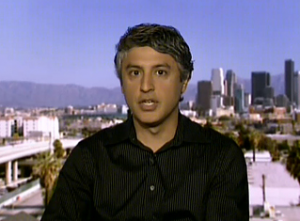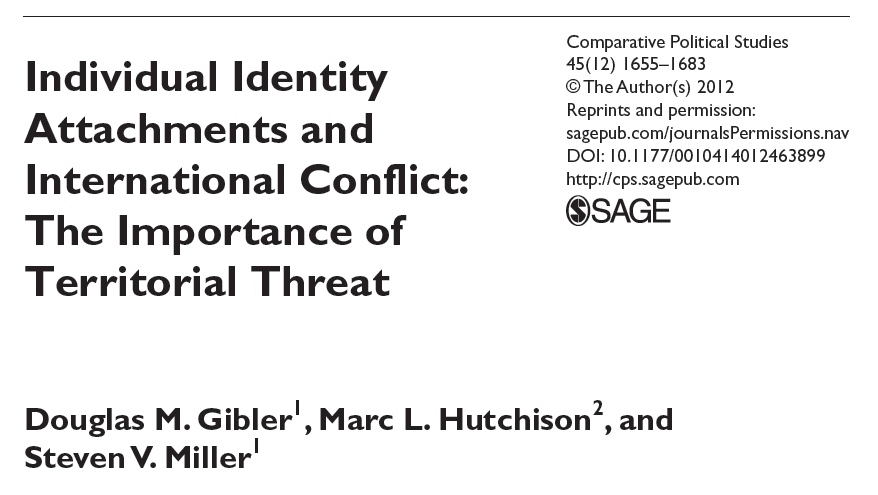 The assumptions within the assertions of identification in the Reza Aslan/Fox News interview have received some attention this week, including Craig Martin’s “Identity Claims Play out on Fox” and Russell McCutcheon‘s “Are You Buying It?” both on this blog. A different comment from Aslan, though, grabbed my attention (unfortunately not for its uniqueness). In addition to emphasizing his academic credentials to defend his study of the historical Jesus, published as Zealot, he argues that his identification as Muslim is irrelevant because his book “overturns pretty much everything that Islam also thinks about Jesus.” Since his work is not trying to promote Islamic orthodoxy, it seems that his religious identification is irrelevant.
The assumptions within the assertions of identification in the Reza Aslan/Fox News interview have received some attention this week, including Craig Martin’s “Identity Claims Play out on Fox” and Russell McCutcheon‘s “Are You Buying It?” both on this blog. A different comment from Aslan, though, grabbed my attention (unfortunately not for its uniqueness). In addition to emphasizing his academic credentials to defend his study of the historical Jesus, published as Zealot, he argues that his identification as Muslim is irrelevant because his book “overturns pretty much everything that Islam also thinks about Jesus.” Since his work is not trying to promote Islamic orthodoxy, it seems that his religious identification is irrelevant.
Baby I Was Born this Way
 The other day a friend on Facebook posted a fun cover version of Lady Gaga’s 2011 song “Born this Way” — a song celebrated (or, all depending on your politics, condemned) as an anthem for the tolerant left. For example, a verse reads as follows:
The other day a friend on Facebook posted a fun cover version of Lady Gaga’s 2011 song “Born this Way” — a song celebrated (or, all depending on your politics, condemned) as an anthem for the tolerant left. For example, a verse reads as follows:
No matter gay, straight, or bi,
Lesbian, transgendered life,
I’m on the right track baby,
I was born to survive.
No matter black, white or beige
Chola or orient made,
I’m on the right track baby,
I was born to be brave. Continue reading “Baby I Was Born this Way”
The Violence of Constructed Identities

A recurring assertion of the contributors to this blog, as evidenced in the quote on the banner from Jean-Francois Bayart, is that identity is not something inherent or static. Identity is constructed, malleable, temporal. The implications of this assertion are many, and the reality of violence, both recent and past, makes those implications even more significant. Continue reading “The Violence of Constructed Identities”
Microbes and I
 A radio report today was on the Human Microbiome Project, which (according to its own website), “is one of several international efforts designed to take advantage of metagenomic analysis to study human health.” What caught my ear in particular was when Lita Proctor, the director for the project, said: Continue reading “Microbes and I”
A radio report today was on the Human Microbiome Project, which (according to its own website), “is one of several international efforts designed to take advantage of metagenomic analysis to study human health.” What caught my ear in particular was when Lita Proctor, the director for the project, said: Continue reading “Microbes and I”
“Can I See Your ID?”
 Over the past couple of years I’ve noticed a curious new practice in stores when I use my credit card: I often must produce another piece of identification to demonstrate that the credit card is mine. Continue reading ““Can I See Your ID?””
Over the past couple of years I’ve noticed a curious new practice in stores when I use my credit card: I often must produce another piece of identification to demonstrate that the credit card is mine. Continue reading ““Can I See Your ID?””
In Place/Out of Place
 As I recall Bruce Lincoln remarking in Authority: Construction and Corrosion, if you want to see how systems of authority work, then you need to study them when they break down (as he did in the case of one of former President Reagan’s interrupted speeches); for we can’t usually see them when they’re functioning properly, since we take them for granted as part of the landscape. Continue reading “In Place/Out of Place”
As I recall Bruce Lincoln remarking in Authority: Construction and Corrosion, if you want to see how systems of authority work, then you need to study them when they break down (as he did in the case of one of former President Reagan’s interrupted speeches); for we can’t usually see them when they’re functioning properly, since we take them for granted as part of the landscape. Continue reading “In Place/Out of Place”
All-American Fireworks, Hamburgers, Frankfurters and Yoga

With all-American Fourth of July festivities like fireworks, frankfurters, and hamburgers, we continually construct our identification with an imagined community, as Benedict Anderson emphasized thirty years ago. Like the nation, the values that we associate with the United States, (e.g., democracy, equality, and liberty) are imagined constructs whose conceptions shift over time.
The United States is a nation of immigrants with the Statue of Liberty welcoming the “huddled masses” one of those frequently invoked traits. Beyond questions over the place of Native Americans in the nation of immigrants and contemporary debates over “immigration reform” and “border security,” the recent court case involving a yoga program in the Encinitas, California, public schools (which I have discussed previously here and here) illustrates the imagined nature of this national trait in a surprising way. Continue reading “All-American Fireworks, Hamburgers, Frankfurters and Yoga”
Shifting Identification Strategies

The identifications people make are strategic and context specific, as this article by Gibler, Hutchison, and Miller suggests:
[I]nternational conflict exerts a strong influence on the likelihood and content of individual self-identification, but this effect varies with the type of conflict. Confirming nationalist theories of territorial salience, territorial conflict leads the majority of individuals in targeted countries to identify themselves as citizens of their country. However, individuals in countries that are initiating territorial disputes are more likely to self-identify as members of a particular ethnicity, which provides support for theories connecting domestic salience to ethnic politics.
Being attacked leads you to identify with the nation. But if your nation is the one doing the attacking, all of the sudden you’d rather make alternate identifications …
Why is a Praying Atheist Newsworthy?

This week, several media outlets (Washington Post and Huffington Post) have highlighted an atheist who advocates prayer. The man has blogged that when he started a twelve step program he began praying regularly to a being he created (without believing in the existence of a deity), which changed his life for the better. Last summer, I pondered a somewhat similar hypothetical scenario in which a self-identified atheist maintained a belief in god in order to illustrate, as my colleagues here at Culture on the Edge have been saying, that identifications are strategic, not intrinsic. That blog post received pushback from some friends asserting that atheists, by definition, cannot believe in god. Continue reading “Why is a Praying Atheist Newsworthy?”
Culture on the Edge Podcast
 During its working session in Chicago, in November 2012, the members of Culture on the Edge (pictured below) took some time to record a conversation on identity creation and its study, for The Religious Studies Project (RSP)–a series of podcasts created and maintained by UK grad students that is devoted to the work of scholars of religion from around the world.
During its working session in Chicago, in November 2012, the members of Culture on the Edge (pictured below) took some time to record a conversation on identity creation and its study, for The Religious Studies Project (RSP)–a series of podcasts created and maintained by UK grad students that is devoted to the work of scholars of religion from around the world.
Click here to listen to our conversation.
Apart from thanking RSP’s Christopher Cotter and David Robertson for their interest in our work, we would like to thank Andie Alexander, then a student in the Department of Religious Studies at the University of Alabama, for assisting with the technology, and also thank the Department for supporting the group.)

